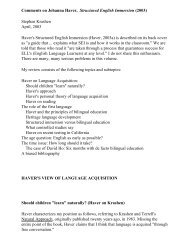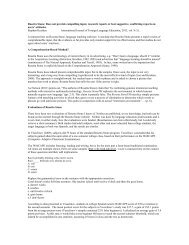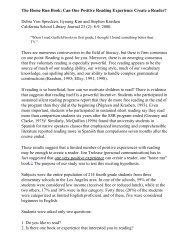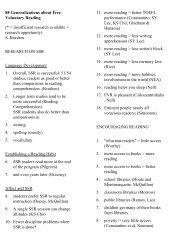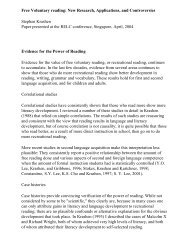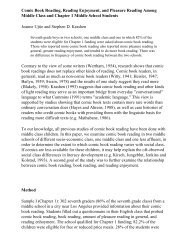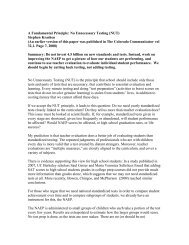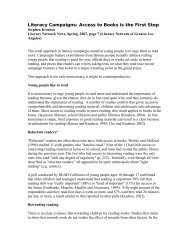Second Language Acquisition and Second ... - Stephen Krashen
Second Language Acquisition and Second ... - Stephen Krashen
Second Language Acquisition and Second ... - Stephen Krashen
Create successful ePaper yourself
Turn your PDF publications into a flip-book with our unique Google optimized e-Paper software.
overconcern with correctness, however, can be a problem. The overuser may be so<br />
concerned with form that he or she is unable to speak with any fluency at all.<br />
The Overuser<br />
Stafford <strong>and</strong> Covitt (1978) present an instructive case of a Monitor overuser: S, a<br />
Finnish speaker who, like P, knows many of the rules of English, but who is often<br />
unable to communicate in speech. While her written English is quite accurate,<br />
Stafford <strong>and</strong> Covitt remark that "she speaks very little, because she tries to<br />
remember <strong>and</strong> use grammar rules before speaking". S's self-correction behavior<br />
reveals her lack of faith in her acquired knowledge of English. Stafford, <strong>and</strong> Covitt<br />
report that she generally does not trust her intuitions about English syntax but relies<br />
on conscious rules. S describes her own situation as follows: "I feel bad... when I<br />
put words together <strong>and</strong> I don't know nothing about the grammar."<br />
Birnbaum (1976) characterizes the speech of Hector, another adult second language<br />
performer <strong>and</strong> ESL student who shows signs of overuse, as follows: "In a segment<br />
of conversation that lasted slightly less than fifteen minutes, there is not a single<br />
lengthy utterance that is not filled with pauses, false starts, repetitions, <strong>and</strong> other<br />
speech repairs.... There are over 69... instances of repair (not counting pauses)." We<br />
are not surprised to learn that Hector's written English, his class compositions<br />
"produced in a situation where extreme monitoring is possible--are among the best<br />
in his section".<br />
The Monitor overuser refers to his conscious grammar all the time when using his<br />
second language. This may be due to an overconcern with correctness, "S", the<br />
overuser described by Stafford <strong>and</strong> Covitt (1978), who admitted that "I feel bad<br />
when I put words together <strong>and</strong> I don't know nothing about the rules", is clearly this<br />
sort. Mr. J., described by Nida (1956), also seems to be an overuser of this type. Mr.<br />
J., a missionary, became an expert in the grammar of his target language but never<br />
spoke it. Nida suggests that this may have stemmed from his early use of a<br />
nonprestige dialect of English <strong>and</strong> his efforts to learn the prestige form ("he felt he<br />
could not dare for a minute to make a 'mistake', thus exposing his background <strong>and</strong><br />
15



